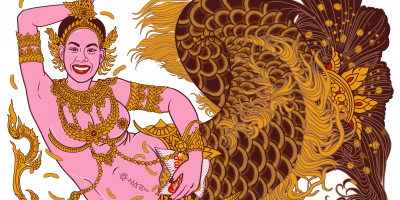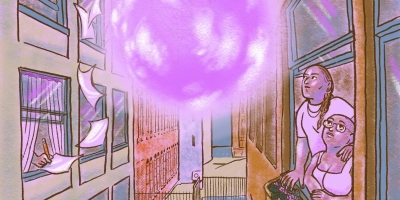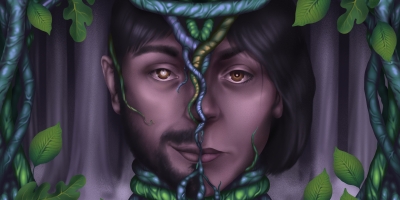Nonfiction
Stories That Sound Like Love / Bedtime Stories
by Matthew Mastricova

Stories That Sound Like Love
My grandfather died shitting on the toilet in his own home while his daughter slept in the next room. My grandmother died alone. The last time I saw her there was a shingles outbreak in the facility she was housed in. It smelled sterile but looked septic. White and off-white everything and the air was sandpaper stiff. She did not know who I was; she forgot she had grandchildren or children but remembered her brother. In my memory her eyes are wild and enormous, too big to possibly be real, and her voice is creaky like a tremored hand. She begged her brother to help her, her roommate was stealing all of her money, and my dad said he would do what he could. She did not ask about her husband. She wanted to feel safe. We didn’t stay long, probably less than an hour. It wasn’t sad but it was upsetting. She was dressed in a medical gown, her body a round floating egg in her bed. I want to say that my dad held her hand, that he gently caressed her greased gray hair as he promised to help her, but I don’t remember if he did. He said he loved her. He would stop by again soon. I don’t know the last time he saw her, but I remember my mom telling him to visit again before it was too late and my dad saying he would, he would.
The last time my dad saw my grandmother was at her funeral. She looked tired but not at rest. I don’t remember my dad crying—I don’t remember a time when he allowed me that sight—but I remember the days leading up to the funeral. I remember my dad sitting at the table coordinating his siblings and father, the order of the readings and the arrangement of the pallbearers and the payment for the casket and the service. He stood at the service in his black suit and took note of who paid their respects, who never appeared. I had not learned to tell my dad I loved him yet, but I never forgot the people who did not come: I held onto this rage for him. My grandfather was there, too, not dead yet, and I don’t know if she would have seen that as a cruelty. I sat next to him at the repast, and with gruff affection he told me stories of raising my dad, stories that would have sounded like love if we were strangers, if I did not grow up in the shadow of his cruelties.
I wonder how he spoke to his wife in their final days together. I wonder if he would have said he loved her. I wonder if he believed that he did.
Bedtime Stories
Once upon a time there was a chicken nugget named McNugget the Chicken Nugget. He lived a happy life, and he was loved. Sometimes he lived with his family—his father, his mother, his brother and sister. Sometimes he lived on his own. Sometimes nobody knew who he lived with but they knew that he lived in a house in a neighborhood he loved very much. He was never alone, he always had friends: other chicken nuggets, a milkshake named Janice or a pack of fries. Maybe a dragon, or Grimace. In multiple timelines he had a Grimace. Sometimes the Grimace was impaled or set on fire or was snatched by an enormous lime-green hawkmom to feed her children, but McNugget always lived happily ever after. And in the next timeline, McNugget always lived happily ever after. And in the next timeline, McNugget always lived happily ever after. The boy who imagined the infinite lives of McNugget would find a way for McNugget to end up home and happy and asleep, no matter how cataclysmic the events of that timeline. The young girl who listened would laugh at every escapade, and the boy enjoyed hearing her laughter. The boy would shut the door on his way out, leaving her to ponder McNugget’s lives in the dark, by herself, in a room that he, too, had once slept in. When asked where he came up with these stories, the boy shrugged. That night’s life would simply appear in his mouth, waiting to be shared. Sometimes their mother would be in the room, too, but she never understood that absurdity was the point. What the mother loved was not the story but the sight, her children creating stories, together, even though they were ten years apart.
The last anyone heard of McNugget the Chicken Nugget, he was living in a house somewhere with someone, but something had changed. It was like the engine driving his life had seized after disuse. He had been waiting for life to happen and then when life finally hit him he didn’t know what to do. He had two friends but they were the kind of friends you have because there’s nobody else around who’s willing to give you the time of day. Was there a Grimace? It’s hard to remember, the details didn’t come like that anymore. There were the two friends and they died and nobody knew what to say about that. At the end of the story, the young man telling the story of McNugget’s life sat dumbly on the edge of his sister’s bed. He knew this was not what she had wanted when she asked for a story about McNugget. He imagined she had wanted something magical and effortless, and instead had received a story studded with fumbled silences. It had been years, maybe, since the last time he searched for McNugget. He had been stretched out by puberty; soon she would be, too. He didn’t know where the magic had gone, how to find the source of the joy they had both felt at the end of the story. Where had McNugget gone? At the end of his life he lived happily ever after, and the boy and his sister sat in the dark together. He knew that there were no more stories to tell, even if his sister asked again. McNugget may be living happily ever after, but not in that room. Not with them.





